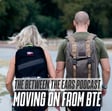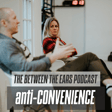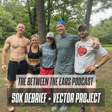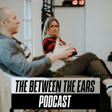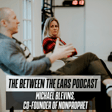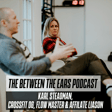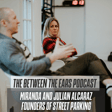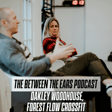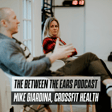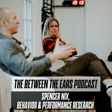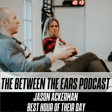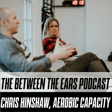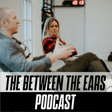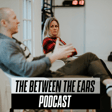Become a Creator today!Start creating today - Share your story with the world!
Start for free
00:00:00
00:00:01

A DØSE of Novelty to Expand Your Mind + Body
K and Bill chat about the DØSE and what goes into creating novel and powerful experiences using challenging workouts as the mechanism to expand the mind.
This chat explores some of what led them to not just create the DØSE, but BTE as a whole, including their experience as long time CrossFit Affiliate owners, and how a beautiful and powerful 3 part, 5 word mantra is maybe the ultimate benefit people experience by engaging in DØSE and BTE as a whole.
To sign up for DØSE, click here.
To see upcoming ETHOS seminars: click here.
Transcript
Intro: Podcast Style and Scheduling
00:00:00
Speaker
Hello. Hello. All right. We're back. We're back. Talking about the dose today. Last week or last episode. Which was last week. Yeah. I don't know about the one every week frequency. Well, I think right now we're going with
00:00:26
Speaker
more casual and maybe when we feel compelled, less rigid as most good podcasts are. Unprofessional. Unprofessional, highly emotionally driven.
The Dose: Evolution and Challenges
00:00:45
Speaker
Well, but I think
00:00:48
Speaker
the dose that this topic has kind of swirled around quite a bit since we launched it last February. And this is not necessarily a podcast about the details of what it is or as you said, like an advertisement for it. So it's more about, yeah, I don't know, kind of like, what are we doing with it? How, how, how's it going? What our challenges are? What,
00:01:15
Speaker
maybe a little bit about what it is for people. Yeah, what we've observed. One of our clients at Between Years Fitness is a marketing advertising guy. And early on when you were first training him, you guys were talking about what works with marketing. And he said a couple
Novelty vs Familiarity in Marketing
00:01:37
Speaker
of things. He had a couple of things I think were interesting for us to consider.
00:01:45
Speaker
if something is too new, too different, it's hard for people to understand. And like that fast thinking process is like, you just kind of dismiss it. Like, I don't know what that is. Like, I don't, I don't want to do the work to figure it out. Yeah. I have to try to figure it out. Right. And then there's the other side where it's like, the other side would be what?
00:02:10
Speaker
just super familiar and like, Oh, this is just like everything else. Not interested. Yeah. So there's like this very delicate in between that like it's novel, but also easy to understand. And I think that's where sometimes with our, some of our things, like we want to make it simple and some of it is simple, but unfortunately like there are complexities about,
00:02:41
Speaker
what it is to be human. And so I think the dose has been an example for us of maybe falling too much into either too much into novel, like I don't get it, or for some people, they're like, oh, I already know that. I get it. And they don't really get it. So I think for us, that's been a challenge. What do you think?
Fitness as a Path to Greater Meaning
00:03:11
Speaker
I think, yeah, there's parts of that. Some of that I think is on us of the language and the reason why we even called it the dose. We have been known for a long time for workouts and experiences that are mind expanding, that show people something that
00:03:41
Speaker
I mean, in some irresponsible ways, they weren't ready to see some of the more immersive events. In other ways, the thing they needed to see that they didn't know they needed to see. But a fitness as an expression or a gateway into something deeper and more meaningful about their life than just. Yeah. And so we were like, well, that would be really cool. You know, between there's fitness, our gym, our brick and mortar gym is a
00:04:11
Speaker
very novel concept concept because of our experience in kind of taking a novel concept to the end of the road, I would say crossfit where it's like, listen, there's only so much fringe that you can operate in when you have a
00:04:39
Speaker
gym the size of the gym that Motown is. What do you mean? What do I mean? At a certain, we were in, so prior to opening between there's fitness, which was 2019 really is when we said, hey,
Owning a CrossFit Gym: Balancing Expectations
00:04:59
Speaker
we're going to open up this site. We had Motown across the gym, 6,000 foot crossfit. Yeah, for a dozen years.
00:05:09
Speaker
over the course of that dozen years of being affiliate owners. 14. Well, at the time it wasn't. Okay. Okay. You good? Yeah. All right. Throughout that time of being affiliate owners, you and the staff and I together had all
00:05:36
Speaker
contributed to this operation. And you and I, for the most part, were the captains of it. And the coaches were the kind of executors of the vision, like any team or organization goes. But the members also contribute to the organization. And they contribute to the organization by
00:06:03
Speaker
well, signing up, coming to classes, canceling memberships, offering feedback, hey, I like this, I don't like that. And it's like, great, because it is a two way thing. But I think that the, so that's just our one gym. Then you take that and you look at the ecosystem of CrossFit. And we'll just say North America CrossFit. Then you have the rise and the influence of the games. You have,
00:06:32
Speaker
the Instagram influencers where first it was .com and the message boards and like the journal, which was like, give me, give me, give me, I can't get enough of this. Now it's like you can literally spend an entire day only looking at what people did for a workout that day of your favorite people.
00:06:52
Speaker
So that contributes to this center of mass, that is this identity crisis of CrossFit. What does CrossFit mean? Because what people are saying, what people are demanding, it's a consumer demand. This is the popular, understood definition of CrossFit. This is the center of mass, as you say, and this is what we want. And so that's kind of driving
00:07:21
Speaker
that is driving the business. It's not to say obviously that the members call the shots, but they get a vote just like a fucking regular company. I think your best analogy with this is like a restaurant.
00:07:41
Speaker
you might have asparagus soup on the menu and you think it's absolutely amazing. And if nobody orders the asparagus soup, and this is kind of an extreme, but like if nobody orders it, then they are driving. Like then, then you're letting a lot of asparagus go to waste every day. You're making the soup or throwing it out. Like what are you doing? At some point you're going to take it off the menu. So that's not to say that they're now the chef,
00:08:10
Speaker
but there is a, you have to consider what people want. Right.
Educating vs Imposing in Fitness
00:08:15
Speaker
But within the CrossFit space and within the CrossFit sort of how to run an affiliate space, people will say, you just need to educate your members more. So it's like, okay, so how much, so you're going to tell them how good, nobody fucking wants to eat asparagus soup. Right. So like, for example, as of recording this episode, the main site workout is four rounds.
00:08:36
Speaker
25 GHD setups and 25 toes to park. Yeah, go ahead and program that at a CrossFit affiliate. If we program that at Marston, we could get away with it because we had enough people. We had a certain membership base where it's like,
00:08:56
Speaker
whatever. When you don't have that many members or when every single meal you serve is like, okay, you're in the trenches, yeah, that's not going to work. So anyway, when we were at the helm of Morristown- Yeah, I just want to pause on the education piece. I think
00:09:19
Speaker
Yes, always education is ideal. I mean, if people wanted to learn more and if all it came down to was like, oh, educate people, you and I would have a line out the door and we would have more people than we know to do with. Because I think if people are open and want to learn and take the time to educate themselves,
00:09:43
Speaker
Yeah, there's probably like, oh wow, this makes a lot of sense. And I'm not faulting people for not wanting that, but for most people coming to a fitness, recreational fitness operation who have jobs, kids, lives, maybe they do have hobbies they're interested in that aren't fitness. They don't want to like stand at the whiteboard.
00:10:07
Speaker
and learn about whatever education. And it's not to say that, yes, you can educate people without giving them a lecture. But even at that, after a dozen, 14 years, whatever it is, there's an appropriate amount of people don't want to like, there's a cap on that, I think.
00:10:30
Speaker
I think I agree with you and I think the challenge that I've seen and the criticisms that I have for what I see from supposedly people who are the best in the business, you're not actually educating them. You're indoctrinating them. You're trying to indoctrinate them to believe what you believe. That's not education.
00:10:50
Speaker
And that's one of the challenges, like if education was the only, the be all end all, like, well, then college would be a worthy investment, which it's plummeting to. And yes, learning and being a student is totally different. Education is, so anyway, it could be a little semantic. So my point is- So we got the gym at the time to- So we did a variety of things that were at the time,
00:11:18
Speaker
Like, for example, we had the Motown menu, right? When I was down in fifth group, we loved spending time in Nashville. There was this one restaurant. It wasn't even a restaurant. It was this social club. Pinewood Social. Pinewood Social. There's a bowling alley. There's chicken and waffles. There's a badass coffee bar. It's like this place rules.
00:11:35
Speaker
And they had this- Remember when we thought though it was like, it was like a strange like swinger, like when we showed up in the like outdoor area and there was like no one there. We're like, is this- Well, it's like an adult playground. You're like, okay, that sounds weird. Are we like missing something? But anyway, cool spot. We were sitting in these two leather chairs and they had like a hard board with pages as menus and they were like layers. So you could kind
Innovative Gym Practices
00:12:00
Speaker
of see the tabs and we're like, this is cool.
00:12:03
Speaker
you know, in Jersey, it's like the shitty diner menu. That's like laminated and no, this was like a cool proper. It was cool thing. And we're like, this would be cool to take back and like little, little extras that we put into that. Did that, is that what got people coming to the gym? No, absolutely not. But what I'm saying is at that time that was,
00:12:27
Speaker
So what we did was we just like a menu has the options that you can order from and nice menus. Like I read a menu and I see a lot of words in different languages. I'm like, I don't know. Is this food or am I reading a dictionary? Anyway, you're not, but people that restaurants that have little, little things about it. Oh, this burger is going to make, you know, make you
00:12:51
Speaker
Whatever. So Monday through Friday, we only did Monday through Friday. So we did Monday through Friday, publishing the workouts ahead of time. With a little, with a little note about their intention. And at the time, what I'm saying, what I'm getting to at the time, that was, that was like not even, no one was doing it. That was not even, that was like, why would you do that? Because the underlying assumption or the belief, again, belief,
00:13:20
Speaker
people will pick certain people are going to cherry pick and it's like, wow. So you think people are that big of shit bags. Now there will be people who cherry pick, but there's also people who don't care and who are going to go one day, Wednesday, Friday at 9 AM because that's when they can or Tuesday, Thursday at six 15, or they're going to come regardless in like all of these different things. So our approach and our belief at that, at that time,
00:13:50
Speaker
which was almost 10 years ago now was why don't we do whatever we can looking outside of the fitness community to improve the experience of people inside of the gym. So we put up the workouts Monday through Friday on Sundays ahead of time that way. And we printed it and we put it out and people could look at it. And we had for every day, we had a little one sentence intention with it.
00:14:17
Speaker
A little clever thing, you know, get ready to feel your heartbeat through your eyes or, you know, back it down today and focus on this or that or breathing. The intention. The intention. Something. And then on the other side of the page, we had STM. Right. Which was your. The STM version of each of the work. The STM version of Monday through Friday, which was your creation, which was something to move.
00:14:41
Speaker
for that experience that we've all been in where like, look, I don't want to do nothing. I'm definitely not doing something crazy. I just want to do something to move. If you and I experienced that and likely the person listening to this podcast, you know that the non-fitness junkie person is also experiencing that. So we had that. We were also hosting level ones, plenty of trainers and level and all of that were like, wow, this is really cool. Like, Oh, I see what you're doing here. And that was great.
00:15:12
Speaker
but that was towards the fringes of what the center of mass and the entity of a, of the CrossFit organism. Yes. And it was also coming at a time where there was more games, more increase in social media. We were battling that more and more when we first started some of these ideas, some things we were sort of,
00:15:39
Speaker
not battling that. And it just got exponential in people coming to the gym, had expectations. So that kind of rock or whatever was like picking up speed as it rolled down the hill. So to get back to this, we're talking about Between the Ears being novel. Okay, right. So in saying that, what I was trying to say was CrossFit was at one point novel. Yes.
CrossFit's Mainstream Shift
00:16:05
Speaker
It is no longer novel. Right.
00:16:08
Speaker
counterculture to the point of our... It was counterculture, now it's mainstream. Right. Which whatever, that's the life cycle of new things and that's whatever. The point is our experience in a novel environment, CrossFit. Yes.
00:16:26
Speaker
We got to a point where trying to continue the novelty or live or extend into the fringes, the menu, STM, breathing, sandbags, equipment, between the ears, sprinklings. It was like, Hey, I don't want the asparagus soup.
00:16:46
Speaker
Right. And it was like, okay, fair enough. People have spoken, have spoken the, the, the, the, the voters, right? Like they have a vote, they have a say. And at a certain point, it's like, okay, we're running a business. Want to provide for the members want to have a do this and that it's time to look elsewhere for a more creative novel things and bring them to life fully without any limits on people's expectations. So,
00:17:15
Speaker
You know, that is for sure between the ears. Now, you know, that's, but the novelty, um, sometimes it's frustrating that some of the stuff that we, that was so, and I'm trying to think of some examples, but that nobody was doing at the time and we were kind of crazy for them became, Oh yeah, of course everybody does that. And it's like, man, we're sort of,
00:17:45
Speaker
Sometimes it's frustrating because we have novel ideas and then it's hard for people to understand them or grasp them. But then somehow they pick up and then they become mainstream. And it's like people have a hard time getting ahead of the curve. But at any rate, between the ears, fitness, and yes, what's novel about it is it's not a CrossFit gym.
00:18:13
Speaker
which we've talked about, even though a lot of what we do is old school CrossFit, true variants, all that stuff, it is novel because of some of the components. It's a small group. It's custom to what that person needs. It's non dogmatic. We consider people's system where they're at that day, all these things that we think aren't actually that fringe.
00:18:43
Speaker
They could be integrated. That's the whole thing. They're not that fringe when you zoom out far enough and you look at human health.
Mind-Body Connection in Fitness
00:18:53
Speaker
Yes. They're fringe when you look at the fitness industry. They're fringe for sure when you look at the fitness industry and for CrossFit. And that's where we're not a CrossFit also because that
00:19:10
Speaker
The vessel that people, when we've had this discussion because it's like, well, we're, we're not a CrossFit. We're doing things. We're going into affiliates and helping them. What we think is helping them provide a better experience in their CrossFit. So it's like, we're not a CrossFit. Well, we're not a CrossFit because by that center of mass standard, you know, it's, it's a miss. It's a miss. So if people see on the affiliate map, Oh, there's a CrossFit in Far Hills.
00:19:38
Speaker
their expectation of what that is, is you come in, that's the workout, there's a group warmup, everybody does the same thing. There's rope climbs, there's muscle ups, there's whatever this assortment is. And so for them to come in and be like, but wait a second, what are you talking about? We're not all doing the same workout. There's only two barbells. It's just currently not set up to be that way. So anyway, but to get back to some of the
00:20:08
Speaker
The dose being also a novelty, and when you say zooming out the human experience, it is kind of crazy to me. It isn't novel at this point to understand the brain-body connection, mind-body, whatever. That's become very mainstream.
00:20:33
Speaker
I mean, that's yeah. Do you agree? Uh, yeah, it's almost like to say the brain body connection is like saying the heads, tails connection of a point. You're like, it's the, it's, what do you mean? We're just talking about a coin, our system. And for as much as like the research scientific community will contradict itself constantly. That's one of the few things that's not, that's the, one of the only things that the scientific research community agrees on is yes, the body mind.
00:21:02
Speaker
it's like one word, not two different things. You can't separate them. So I guess for us with the dose, the novelty, I think what's novel about what we're doing in that realm, even with like ethos, but mostly more so with the dose is I don't know that it's really been done or I mean, maybe someone's doing it. I don't know where there is,
00:21:34
Speaker
a very thorough understanding of neuroscience, therapeutic concepts, even like philosophy, like this whole bucket of kind of mental wellness thoughts, all that introspection, neurology, coupled with what people say or
00:22:04
Speaker
what's spoken about in podcasts, what's written about in books, like, okay, cool. And then, and then how do you feel that through the body? Like, okay, that's, if you only read about things, you never did them. You would only have half the, like, like that would be like saying, I'm going to read all about Italy, every book about Italy, but I've never gone to Italy.
00:22:28
Speaker
your experience will be limited. Your experience of Italy is what you've read, which is wonderful. Yeah, but it's like you're experiencing something about it. You're like reading about it and you're, you're grasping knowledge about Italy, which is more of an experience about that country than a few had not. But then going,
00:22:49
Speaker
You're explaining things about the country. You're not experiencing the country. So the experience of going and the senses and tasting the food and seeing the sites and hearing the people, like, so I feel that is kind of where we're at right now with that mind body thing. People are listening to Huberman. They're reading books. They're saying the words.
00:23:13
Speaker
But there's a lot left on the table for that, like, OK, now, cool. Like, what about both from a?
00:23:22
Speaker
what we do with like the self assessment, kind of applying some of that stuff. But that's not the dose. I think that's, I'm just saying, I'm just, I'm just trying to finish my thought, which is just a bigger thing. Now, yes, within two different groups, there's the self assessment stuff we talk about, which is like just getting to know kind of what's happening in your emotional state and how that influences your body. And then there's the dose, which is these like physical,
00:23:51
Speaker
ways to experience some of these concepts and whatever we're calling them philosophies, mindsets, therapeutic concepts, whatever that bucket is. And I think that's very abstract for people. Fine. I think what you were describing though, is what we do more so at between the years fitness, which is kind of what I was trying to say earlier.
00:24:16
Speaker
Between the years fitness is a comprehensive, holistic, well-rounded, whatever you want to say, physical and mental and emotional fitness practice. Now we have legitimacy to say what those things are, not just marketing speak or not just secondary and tertiary byproducts of just saying, no, no, no, it's this.
00:24:44
Speaker
It's not an indirect thing. It's a direct thing. We're directly raising awareness and training people on the quality of their physical state, the contents of their thoughts and their awareness and connection emotionally every single day, every day that they choose to do what the thing is.
Critique of Science in Wellness
00:25:04
Speaker
Huberman and a Tia and you know, all the other people, the biohacking, it's like the modern day biohacking. See people I love, like there's some other popular guy who's fair enough, fine enough. But like your story is that you lost a hundred pounds. I mean, cool. Who cares?
00:25:25
Speaker
But relative to this, what was the deal? Well, now it's a study in this and that. And it's like, but you're seeing the world only through your own very limited experience of this is what I did. And therefore, that's what you should do. Or I did this. Therefore, I am qualified. Sure. So that guy. But what are you getting back to Huberman? It's biohacking through science.
00:25:55
Speaker
Like Tim Ferriss, I don't think Tim Ferriss really, why is everybody citing studies now? Everybody looks, not everybody, I shouldn't say that. The pattern of the sort of wellness, fitness, practice kind of thing is you need a study.
00:26:22
Speaker
to basically certify this isn't just some quirky nonsense because I think, and this is where Tim Ferriss back in the day was like, hey, I'm going to experiment on myself and share my findings, which is really cool. But at a certain point, it's like, well, people have less and less trust and somehow the scientific community
00:26:47
Speaker
is this kind of like you're not going to, what are you going to quote, go against the science as if it's a thing and not a process. So now within the sort of Huberman, Atiyah, these people are doctors. They know how to read studies. People see this, people who have never taken a class on research, by the way.
00:27:07
Speaker
I've taken two classes and I would say two graduate level classes and I say, I am like weak on the whole thing. So it's just like, oh, a study. Forget the fact that they didn't read the study. They don't understand P values or any of this other stuff. They point to a study. But you're not talking about Huberman or Peter Tia because clearly they know they're familiar with research.
00:27:31
Speaker
They're familiar with research, of course, and they're doctors and they're in the scientific community. What I'm talking about is the stuff that
00:27:41
Speaker
they're talking about, how does that trickle down? Right. How do you apply it? What does that mean? You're not going to contract Huberman or Atiyah to come teach your coaches how to implement a fin to say. And frankly, some of it's like, well, there's limits to that. Sure. So the, the recent Huberman podcast, cause it is appropriate, like this isn't a great example.
Willpower and Real-Life Application
00:28:05
Speaker
It was about willingness or willpower. It's about willpower.
00:28:12
Speaker
And sometimes it can be, it can be validating and frustrating all at the same time. Because when we listen to that podcast, it's a lot of the science. The whole episode is about willpower and like, is it finite? Like can, can you run out of it? Can you manufacture it like willpower as a, as a, what would you say like an actual physical? Well, there's two things to it. Like where does it exist in the brain? So there's the actual sort of neuroanatomy.
00:28:39
Speaker
and as a resource, as like a skill. Is it finite in the sense that it's like you only have X number amount, right? It's depletable. So it's an interesting podcast. I will say that in small doses, I mean, even though this is like what we listen to, like it's a lot, it's a lot to listen to and understand there's a lot of brain anatomy.
00:29:05
Speaker
But then when we finish it, we think about like, man, we train people on willpower, willingness. So these brain neuron concepts, like things that are happening in the brain, that's like wonderful to learn. And we know a lot of people that are listening that aren't applying it, but the application. And so I guess that's the thing that's so confusing to me is it's not like Huberman is someone that like
00:29:36
Speaker
Like he has become a household name and people are interested, but to your point, like, okay, so, but yeah, what are you going to do about it? What about how does that trickle down into your life? And we're standing here with this big sign and fly being like, Hey, like over here, like you can feel apply, learn about these things, onboard them, experience them.
00:30:01
Speaker
for people who are interested in fitness. Obviously, if you're not really a fitness person, maybe you're not as keen on that, but generally someone listening to Huberman might be interested in health, and we lose people at that. I don't think it's that big of a leap to say,
00:30:19
Speaker
Hey, we're talking about willpower. This is just an example. Here's an experience for you to understand how to interact with it, have a relationship with it, because it's a pretty big one for people's life in many ways. And people are like, whoa, what are you talking about? And I guess that's sort of for me, very confusing. I don't think everybody maybe is interested, but I would think more people
00:30:47
Speaker
would want to dip their toe in that water. Well, I would like to think that too. Unfortunately, from what I've experienced with people, it's the idea of it. It's the idea of it or the ideal of doing that. So here's a question as it relates to the actual logistics.
00:31:11
Speaker
Do you think people are, I think it's many things. One, people might be more about the idea of it, but then when it comes down to doing it, it's like, ah, that's where you lose me. Maybe it's, but I already go to this gym. These are the workouts. These are the days I'm not willing to deviate because I can't obviously do this workout, the dose workout this week in a class. That means I need to do it in my home at open gym. I need to change my.
00:31:41
Speaker
schedule. So that's where you lose them. Or I follow this program. This might mess up my, I'm supposed to do snatches today. The dose is sled bike. Like some of that where it's like, whoa. And then the irony of that stuff is like, ironically,
00:32:07
Speaker
You know, we know games athletes, we've had games athletes abandon their regular schedule program to do something cool with between the ears because there was value inherent in that. So it's kind of like, which is part of why we call it the dose in the sense of not just the stimulus. I think we can talk about why do we typically program workouts with a certain sting to it, but the dose as a related to a mind expanding experience,
00:32:36
Speaker
not unlike a psychedelic experience. Which you call dosing someone. Which you call dosing someone, right. If you're going to have a hero dose through psilocybin, you're going to have five grams of mushrooms, put an eye mask on, and change consciousness as you know it. Well, obviously, that's not approachable or enjoyable for me.
00:32:59
Speaker
That's not what we do. That's not what we do. That's not what we do. No, that's not what we do. My masks, sometimes. My masks, yes. It's like at Alex. No. Mushrooms, not yet. Certainly not legally or publicly. Anyway. Dosing people. Dosing people. And you spoke about, well, look, I have a program. I have to change my schedule. I have to do something that is different.
00:33:28
Speaker
where the tide of psychedelics is, Bill Richards, one of the most influential minds in, and really just look him up. He's like, he's, he's been huge in, in the psychedelic space. He has a mantra that like blew my mind and just like reached my heart. And it's the simplest thing. And this guy's like just amazing.
Psychedelics Mantra in Fitness
00:33:56
Speaker
Trust, let go, be open. Take that into every, take that, he was talking about taking that into your journey, which shit, I wish I knew that before I smoked the toad and did all of that, but like, but again, like, okay, so how do you do that though? Even if I knew rationally about that, and this is where it's kind of like, even if you know rationally about something, how the, how the heck are you practicing it?
00:34:24
Speaker
in a state of mind that's not the thing you're going to go into. In this case, like a psychedelic experience or a board meeting or a whatever highly charged thing. So how do we practice expanding our mind in an approachable way that you can go to work and return home and drive afterwards?
00:34:47
Speaker
Well, the fundamental elements are we say, okay, there's a fitness, there's a workout, there's a mindset component or concept rather. And then there's an introspection piece via specific targeted journaling prompts that are not just about, did you feel your calves in that workout? But where can you find whatever specific to your life? Like coach, like anyway, trust, let go, be open.
00:35:16
Speaker
So if you're telling me that I have snatches planned, I have to go Monday, Wednesday, Friday to class only, there's no flexibility. I have to change something. Those are all very constricting.
00:35:37
Speaker
And that's the problem with excuses. And I don't mean excuses in like a, you're a ship bag way, but just the rationalizations and justifications and reasons and stories we tell ourselves the mindset. Well, something has to change physically, but also environmentally. Do you think you can just change your mind, like change your mind without a physical experience by thinking?
00:36:12
Speaker
When you say a physical experience. Yeah, so let's just take willpower, for example, because we were talking about that. Do you think you can change your amount of willpower? That's just one example by just thinking like, I'm going to have more willpower.
00:36:34
Speaker
Like I'm deciding I don't, I'm not going to have cookies every night, even though I've had cookies every night for the past year. And I'm deciding I'm going to have more willpower tonight and I'm not going to have the cookies. What do you think the effectiveness of that versus like, yeah, more involved experience. I guess just cause like when you talk about mindset, maybe that's not a great example, but
00:37:00
Speaker
I feel like to date the mindset stuff is so limited to like neck up. For sure. I agree. I have a hard time answering that question because to just immediately say no is also eliminating a truth which is
00:37:23
Speaker
Anybody who's done a guided meditation or has dug deep in a moment of fatigue, we talked about this with confidence to belief sessions that we do, the content of your thinking and your thoughts has an influence on your biology, no doubt.
00:37:42
Speaker
yet it can sound really woo and man, like Matt just manifested and like, eh, like, like it's some Jedi mind trick and it's like fuck off. That's, that's ridiculous. However, the story you tell yourself and we have a model with this that we teach people at ethos and every seminar we do,
00:38:05
Speaker
of the connection and the interaction, the relationship between body, mind, mind, body. It's fine. I actually hadn't was talking with this with a client just last night. How do you change your thoughts? Well, one way is to change the state that you're in and your body. So it's like, if you're looking at the head side of a coin,
00:38:34
Speaker
You change that by addressing the tail side and vice versa. So with willingness, which we define as the capacity to say yes, yes to you and willpower is saying no to something else or something external.
00:38:52
Speaker
they work together. It's not an either or thing. Right. It's like head down, top down, bottom up. And I guess that's the thing is like, it's not that one can't be effective.
00:39:07
Speaker
but having both where the body can influence the mind, the mind can influence it, like not leaving that on the table. And that's... Even meditation, there's a state you're sitting in, you're still, like there are physical things that have to do with meditation, walking meditation, seated meditation. So anyway, but yeah, so I think, I mean, that is the... But the trust let go be open part. And that's, I think, where we see
00:39:38
Speaker
In that case, yeah, you might have to trust yourself or us.
Building Self-Trust Through Fitness
00:39:47
Speaker
We have to earn that, but this is all within yourself. Trust that you'll be okay. Like trust that it'll be all right. Trust that you might be okay, even though you don't know exactly what you're doing.
00:40:05
Speaker
You might have to let go of the story you tell yourself of what is absolutely true. You might have to let go of what you think you know. You might have to let go of who you think you are. And in doing so, be open to who you can be. Be open to a new story. Be open to a different way.
00:40:34
Speaker
There's behavior in that there's mindset, there's, there's, there's thinking and there's logic and there's a reason in that. And there's affect and deep emotional resonance in that to trust, let go and be open. And that's some of what we do. So how do you, how do you package that up?
00:40:58
Speaker
in a workout, in a program, is it going to be like, okay, today, all right, folks sit down. We're going to like, you know what they do? Okay. We're going to do trust falls. And it's like, I'm out. Okay. Just like if I hear, you know, if I hear like, uh, Creed and trust falls playing, like I actually remember going into a life coaching certification, be like, I am, I can't walk into this door. Yeah. So, I mean, and the thing with the fitness piece is
00:41:24
Speaker
people who do fitness, this is something you're already doing. So it's kind of a lower barrier to entry because you're like, okay, I'm already doing it. It is funny though, listening to those things, and this always did frustrate me a bit in the latter years of owning the gym, the CrossFit gym.
00:41:44
Speaker
where those things, trusting, letting go, being open, were very much tenants of early CrossFit.
00:41:55
Speaker
It was much more like those things existed in CrossFit compared to the traditional fitness at the time where everything was very structured, black and white. You kind of knew exactly what you were doing. There was a lot of control. And to do CrossFit, you had to inherently trust, let go, be open. And as we got later down the line,
00:42:20
Speaker
I just saw those things deteriorating from everything from letting go of where you stood in the class, which barbell you used, all of those things. And it just started to feel very controlled, very untruth. And we talk a lot about trust with just even trusting yourself. That right there, I think, has been a big thing with what we've
00:42:49
Speaker
gotten feedback on from people, not only in between this fitness where it's just like, okay. Yeah. And it's not like we're sitting around having lectures on this stuff every day, but it's just part of the environment. It's part of the foundation that we've been coming again from anyway. Well, yeah. When you, when you set up people to have agency, which is something else we talk about, obviously to
00:43:16
Speaker
decide how they want to move that day and like feel how they're feeling from a physical, it could be physical, obviously emotional, whatever, that does build trust. Oh yeah, I can trust myself to, if I want to go hard today, oh, I trust myself enough to take a day easy and know that doesn't mean I'm never going to go hard again.
00:43:41
Speaker
Yeah, I think we've talked about that a lot that like building trust in yourself is huge. I mean, when you kind of peel back the layers of maybe personal challenges, like that's probably underneath a lot of them, just not trusting your yourself, your decisions, your abilities, your feelings. Can I trust how I'm feeling? Just understanding your body signals. I mean, I don't know who I was talking to the other day about this. Like even just, oh, I think it was on one of our walks.
00:44:12
Speaker
It was one of our friends who's a parenting coach was talking about potty training because that's a very big thing with parents. And this statistic was crazy. Something like 30% of kids have constipation issues because they
00:44:33
Speaker
they like, they have this situation with their parents where there's an expectation. Did you go like there's this whole thing of expectation and they're waiting and they're predicting like, okay, they're going to ask me. And there's like a body situation that happens and she can probably explain it way better than I am. But even that trusting of like the signal, like of a natural body,
00:44:58
Speaker
activity or hunger. I can trust I'm hungry. Okay, I can eat, but we've turned that off as well. Like, well, but it's not 12 and I'm fasting or I blah, blah, blah. And you know, those are like the basic body trusting what your body's telling you. Yeah. Yeah. What the constipation got you
00:45:28
Speaker
I was always constipated as a kid. No shit. Literally. Literally. No shit. I wanted shit for weeks. Oh, good. We're talking offline. Can't wait. Yeah. So anyway, but that's... Yeah. And that's, I think, a big part of it where that in and of itself, the let go and be open part, I think, occurs over time.
00:45:52
Speaker
Like letting go is so, is very, very difficult. Being open, I don't know, maybe being open is a little bit, whatever. They work, I think beautifully together, which is why this dude built it. Like, what a soul. Our next t-shirt, when we sell the hundreds we have, we'll put that on the next t-shirt. Yeah. Okay. Um, we should, yeah. Anyway, so the trust part, like if you run something, if that's a litmus test,
00:46:19
Speaker
but not one that there's past fails for. Just a question. Just run it through whatever trust filter lens litmus thing for you and looking at how much am I trusting or how much am I not trusting? That's what are you doing? I don't trust that you're,
00:46:47
Speaker
aiming that thing. I don't trust anything that you say. Yes. But that is the trust part of trusting that it's okay not to know and why we generally program workouts that are difficult.
Purpose Behind Difficult Workouts
00:47:07
Speaker
For the dose. For the dose. Not all of them are soul crushing. Not all of them, but they're fucking hard. Because challenge is going to be the exact invitation to reveal or to maybe highlight.
00:47:24
Speaker
Oh, I'm like struggling with trusting that I'll be okay. Or I'm trusting that I can do this or letting go of what I thought I knew, which is where it's like, and we just started, you know, I put a post up recently about doing this project and following along with the Escape Velocity Program from nonprofit.
00:47:50
Speaker
Where it's like, is this six week program going to specifically get me ready for my event next year? Well, yes and no. Like physically, will it be the most specific thing? No. I mean, you're not pushing a sled, for instance, for potentially five weeks, but you're building other things that are going to lend themselves to this. And part of the process, the psychological part, trust.
00:48:20
Speaker
Like that's such a huge bit. Well, that plus being open. If you were trusting, but you weren't open, you'd probably not get as much out of it. And I think that's the piece for people to be just cracking that door a little because so much fitness is dogmatic and that limits the openness part.
00:48:38
Speaker
just trying to be a little more open because you and I have been doing fitness for a long time. We've done a lot of different things from whatever, you name it. And even for us, following something, doing something a little, maybe
00:48:55
Speaker
that requires some openness, some willingness, you know, trusting all those things, trusting obviously people who we believe like have put together a program that is responsible. So yeah, I guess the invitation to people is not so specific. This is again, not an advertisement for the dose. You can apply what we're saying to whatever you're doing right now without doing the dose. But if some of this is,
00:49:26
Speaker
curious to you and you're like, huh, what, what is that? Like I was going to ask you, I think the difference with, you know, we like challenging workouts. I think sometimes there's like a confusion that just because we encourage people at between years fitness to, um, to take days where they may be pulled back. That doesn't mean that we don't think people should go hard. We just don't think they should go hard every day. Um, but
00:49:54
Speaker
So challenging workouts, yes, do them. I think the difference also with the dose and making them challenging is there's a very specific, there's an intentionality going into it. It's not just hard for the sake of heart. Again, not that there's anything wrong with that, but it's kind of our thing like making meaning out of the suffering. Like you're going into this challenging workout with some like
00:50:17
Speaker
intention and kind of a light shined on what's happening in the mind, whereas sometimes with hard workouts, you just kind of go through and finish it, get through it. Again, not that that's wrong, but in this case, it's very specific. Someone did ask about what's your thought process going into every dose programming week to week?
00:50:41
Speaker
Yeah. I mean, I think we covered a decent amount of that. Yeah. But the thought process is not sometimes it's what's interesting. Yeah. What have we been talking about? What's kind of bubbled up. Other times, like for example, we're doing a
00:51:08
Speaker
series this next couple of weeks on a concept called ICUs, which have a connection to addiction. An addiction, not just for people who are having traditional addictions, but the notion of addiction in a broader sense. The notion of addiction not being a substance. So I would write up a thing about that.
00:51:34
Speaker
So it's like, Hey, here's something that we've noticed people have been struggling with talking about, not just like in the news or like, but like in our real world experience that could be clients in a clinical setting that could be clients in a fitness setting that could be friends of ours. That's definitely our own personal thing. And there's no shortage of those. Unfortunately, there's no shortage of human experience.
00:52:02
Speaker
And not that there are always challenges, but whatever. I mean, there's not like a word for it. But there's a reason, I think, why. So when we look at that, like, what's the thought process going in there?
Experiential Learning in Fitness
00:52:16
Speaker
It is experience first. I mean, we talked about this on Andy's podcast where we're two people who have
00:52:24
Speaker
And I've definitely learned this mostly from you. And you raised awareness on some of the more important things in my life that even before I knew you, it was like, oh, you explained to me what the real value was, which is, oh, this is an experience like soccer, military, whatever.
00:52:41
Speaker
We want people to have experiences and that can sound, again, overused and this and that. But like, what are we looking to have someone experience? What are the phases of that experience without it being so specific where it's like you either did it or you did it?
00:53:00
Speaker
Yeah, we want it to be an invitation, not telling someone like, Hey, this is what you're going to, this is what's going to happen, which can be a little tricky sometimes, but, um, yeah. And then, and then the process is often like recently there's been, instead of it just being one workout,
00:53:18
Speaker
a series of weeks where it allows you to explore it. So you have some time and different modalities, workouts to explore that concept and that has tended to work. And sometimes it's like something comes up for us.
00:53:36
Speaker
a tool, we have one coming up that uses actually like a tangible tool that people can download on their phone and how that influenced, how that tool applying that to a workout influenced what happened mentally. So yeah, we've got some both ways, but anything that's sort of, if we think it can be applicable to the human experience, it's like,
00:53:59
Speaker
But that's where I think the, that's where I think the Huberman and Atiyah stuff falls flat because it's explanations. Which is their thing. I think they're not claiming. I get that. I get that. But it's like, why are people not doing, and maybe some people are, but we've had a member, we have a member here who has said, uh, you know, he read the Outlive Atiyah book and was like, if I didn't have this place, I'd be like, what the fuck?
00:54:26
Speaker
Right. How do I do this? Like I'd be so overwhelmed, but now I realize like, Oh yeah. Like I know, I know this. Yeah. This is what we're doing. And that is the, that is the sort of thing that we need to do. So you, you really do need to have that action element. Now it's not to say that we're doing all of that and it's not some biohacking gym. I mean, there's probably going to be them that pump up or pop up or whatever.
00:54:54
Speaker
but the, uh, the experience, the human experience thing that we're looking to invite people to, but not force feed them in the dose we're pulling from such a wide variety and our own experiences, personal, professional, blah, blah, blah.
00:55:25
Speaker
And we use workouts that are approachable, yes, but also difficult because without the difficulty and without the challenge, you don't get to practice trusting, letting go and being open. And therefore you don't get to change your mind. Right. And so that's one of the things that
00:55:54
Speaker
how the fuck do you explain that in a Instagram post or whatever, you know? So who knows? And you know, whatever I'll stop there, but, um, yeah. Well, I think that was a lot for people to dig in. Sure.
00:56:22
Speaker
All right, well, if you are interested in the dose, you can go to our website, btwn.ears.com. You can go to our Instagram. There's a link in the bio. If you're listening to this podcast and you don't know how to find it, there's a problem. OK, goodbye.
